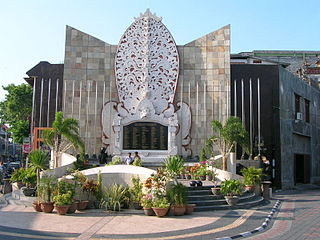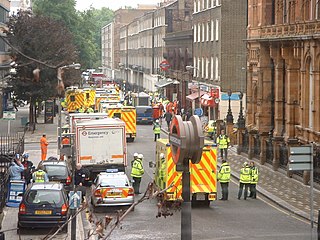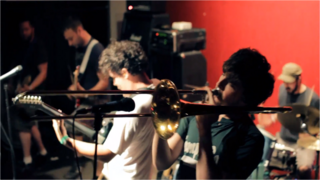
Nagasaki is the capital and the largest city of Nagasaki Prefecture on the island of Kyushu in Japan.

The Oklahoma City bombing was a domestic terrorist truck bombing of the Alfred P. Murrah Federal Building in Oklahoma City, Oklahoma, United States, on April 19, 1995. Perpetrated by two anti-government extremists with white supremacist, right-wing terrorist sympathies, Timothy McVeigh and Terry Nichols, the bombing happened at 9:02 a.m. and killed at least 168 people, injured more than 680 others, and destroyed more than one-third of the building, which had to be demolished. The blast destroyed or damaged 324 other buildings within a 16-block radius, shattered glass in 258 nearby buildings, and destroyed or burned 86 cars, causing an estimated $652 million worth of damage. Local, state, federal, and worldwide agencies engaged in extensive rescue efforts in the wake of the bombing. The Federal Emergency Management Agency (FEMA) activated 11 of its Urban Search and Rescue Task Forces, consisting of 665 rescue workers who assisted in rescue and recovery operations. The Oklahoma City bombing remains the deadliest act of domestic terrorism in U.S. history.

The bombing of Dresden was a joint British and American aerial bombing attack on the city of Dresden, the capital of the German state of Saxony, during World War II. In four raids between 13 and 15 February 1945, 772 heavy bombers of the Royal Air Force (RAF) and 527 of the United States Army Air Forces (USAAF) dropped more than 3,900 tons of high-explosive bombs and incendiary devices on the city. The bombing and the resulting firestorm destroyed more than 1,600 acres (6.5 km2) of the city centre. An estimated 22,700 to 25,000 people were killed. Three more USAAF air raids followed, two occurring on 2 March aimed at the city's railway marshalling yard and one smaller raid on 17 April aimed at industrial areas.

Curtis Emerson LeMay was an American Air Force general who implemented an effective but controversial strategic bombing campaign in the Pacific theater of World War II. He later served as Chief of Staff of the U.S. Air Force from 1961 to 1965.

The Tsar Bomba, also known by the alphanumerical designation "AN602", was a hydrogen aerial bomb, and the most powerful nuclear weapon ever created and tested. Tsar Bomba was developed in the Soviet Union (USSR) by a group of nuclear physicists under the leadership of Igor Kurchatov, an academician of the Academy of Sciences of the Soviet Union.

The 2002 Bali bombings occurred on 12 October 2002 in the tourist district of Kuta on the Indonesian island of Bali. The attack killed 202 people. A further 209 people were injured.

An airstrike, air strike or air raid is an offensive operation carried out by aircraft. Air strikes are delivered from aircraft such as blimps, balloons, fighters, heavy bombers, ground attack aircraft, attack helicopters and drones. The official definition includes all sorts of targets, including enemy air targets, but in popular usage the term is usually narrowed to a tactical (small-scale) attack on a ground or naval objective as opposed to a larger, more general attack such as carpet bombing. Weapons used in an airstrike can range from direct-fire aircraft-mounted cannons and machine guns, rockets and air-to-surface missiles, to various types of aerial bombs, glide bombs, cruise missiles, ballistic missiles, and even directed-energy weapons such as lasers.

The 16th Street Baptist Church bombing was a white supremacist terrorist bombing of the 16th Street Baptist Church in Birmingham, Alabama, on Sunday, September 15, 1963. Four members of a local Ku Klux Klan chapter planted 19 sticks of dynamite attached to a timing device beneath the steps located on the east side of the church.
A box-office bomb, box-office flop, or box-office failure is a film that is unprofitable or considered highly unsuccessful during its theatrical run. Although any film for which the production, marketing, and distribution costs combined exceed the revenue after release has technically "bombed", the term is more frequently used for major studio releases that were highly anticipated, extensively marketed and expensive to produce that ultimately failed commercially.

How to Dismantle an Atomic Bomb is the eleventh studio album by Irish rock band U2. It was released on 22 November 2004 in the United Kingdom by Island Records and a day later in the United States by Interscope Records. Much like their previous album All That You Can't Leave Behind (2000), the record exhibits a more mainstream rock sound after the band experimented with alternative rock and dance music in the 1990s. It was produced by Steve Lillywhite, with additional production from Chris Thomas, Jacknife Lee, Nellee Hooper, Flood, Daniel Lanois, Brian Eno, and Carl Glanville.

The 1996 Manchester bombing was an attack carried out by the Provisional Irish Republican Army (IRA) on Saturday, 15 June 1996. The IRA detonated a 1,500-kilogram (3,300 lb) lorry bomb on Corporation Street in the centre of Manchester, England. It was the biggest bomb detonated in Great Britain since the Second World War. It targeted the city's infrastructure and economy and caused significant damage, estimated by insurers at £700 million, a sum surpassed only by the 1993 Bishopsgate bombing, also by the IRA, and the 2001 September 11 attacks.

The Dublin and Monaghan bombings of 17 May 1974 were a series of co-ordinated bombings in counties Dublin and Monaghan, Ireland. Three bombs exploded in Dublin during the evening rush hour and a fourth exploded in Monaghan almost ninety minutes later. They killed 33 civilians and injured almost 300. The bombings were the deadliest attack of the conflict known as the Troubles, and the deadliest attack in the Republic's history. Most of the victims were young women, although the ages of the dead ranged from 19 up to 80 years.

Bomb the Bass is an electronic music alias of English musician and producer Tim Simenon.

The 7 July 2005 London bombings, often referred to as 7/7, were a series of four coordinated suicide attacks carried out by Islamist terrorists in London that targeted commuters travelling on the city's public transport system during the morning rush hour.

The Sterling Hall bombing occurred on the University of Wisconsin–Madison campus on August 24, 1970, and was committed by four men as an action against the university's research connections with the U.S. military during the Vietnam War. It resulted in the death of a university physics researcher and injuries to three others.

Bomb the Music Industry! were an American punk rock musical collective from Baldwin, Nassau County, New York, United States, led by singer-songwriter, producer, and multi-instrumentalist Jeff Rosenstock.

The United States detonated two atomic bombs over the Japanese cities of Hiroshima and Nagasaki on 6 and 9 August 1945, respectively. The two bombings killed between 129,000 and 226,000 people, most of whom were civilians, and remain the only use of nuclear weapons in armed conflict.

The Boston Marathon bombing was a domestic terrorist attack that took place during the annual Boston Marathon on April 15, 2013. Two terrorists, the brothers Dzhokhar Tsarnaev and Tamerlan Tsarnaev, planted two homemade pressure cooker bombs, which detonated 14 seconds and 210 yards (190 m) apart at 2:49 p.m., near the finish line of the race, killing three people and injuring hundreds of others, including 17 who lost limbs.

On 27 August 1975 a Provisional Irish Republican Army bomb exploded without warning at the Caterham Arms public house in Caterham, Surrey, England. No-one was killed but 33 people were injured, some severely, including three off-duty soldiers who lost limbs.
The Hass refugee camp bombing was an aerial bombardment of a refugee camp in the Syrian opposition-held town of Hass in the Idlib Governorate of Syria, which has been deemed a war crime by Human Rights Watch. It was perpetrated on 16 August 2019, at 7:25 p.m. local time, during the Syrian Civil War. The bombing killed 20 civilians, including a pregnant woman, and injured another 52 people.


















